Cultural Experience in Nursing: Gibbs Reflective Cycle Analysis
VerifiedAdded on 2022/10/19
|6
|1430
|11
Report
AI Summary
This report details a nursing student's reflective analysis of a cultural experience encountered during a clinical posting. The student, utilizing the Gibbs reflective cycle, describes challenges faced when caring for Aboriginal patients, particularly those stemming from language barriers and cultural differences. The report outlines the student's feelings, evaluations, and analyses of the situation, highlighting the importance of communication skills, cultural awareness, and the need for hospital training programs that address cultural sensitivities. The student discusses the importance of support from senior nurses and the application of theoretical frameworks in navigating difficult patient interactions. The conclusion emphasizes the value of transcultural nursing and the need for healthcare providers to prioritize patient care irrespective of cultural factors. The report concludes with an action plan, outlining strategies for handling similar situations in the future, including improved communication skills and seeking guidance from senior colleagues.
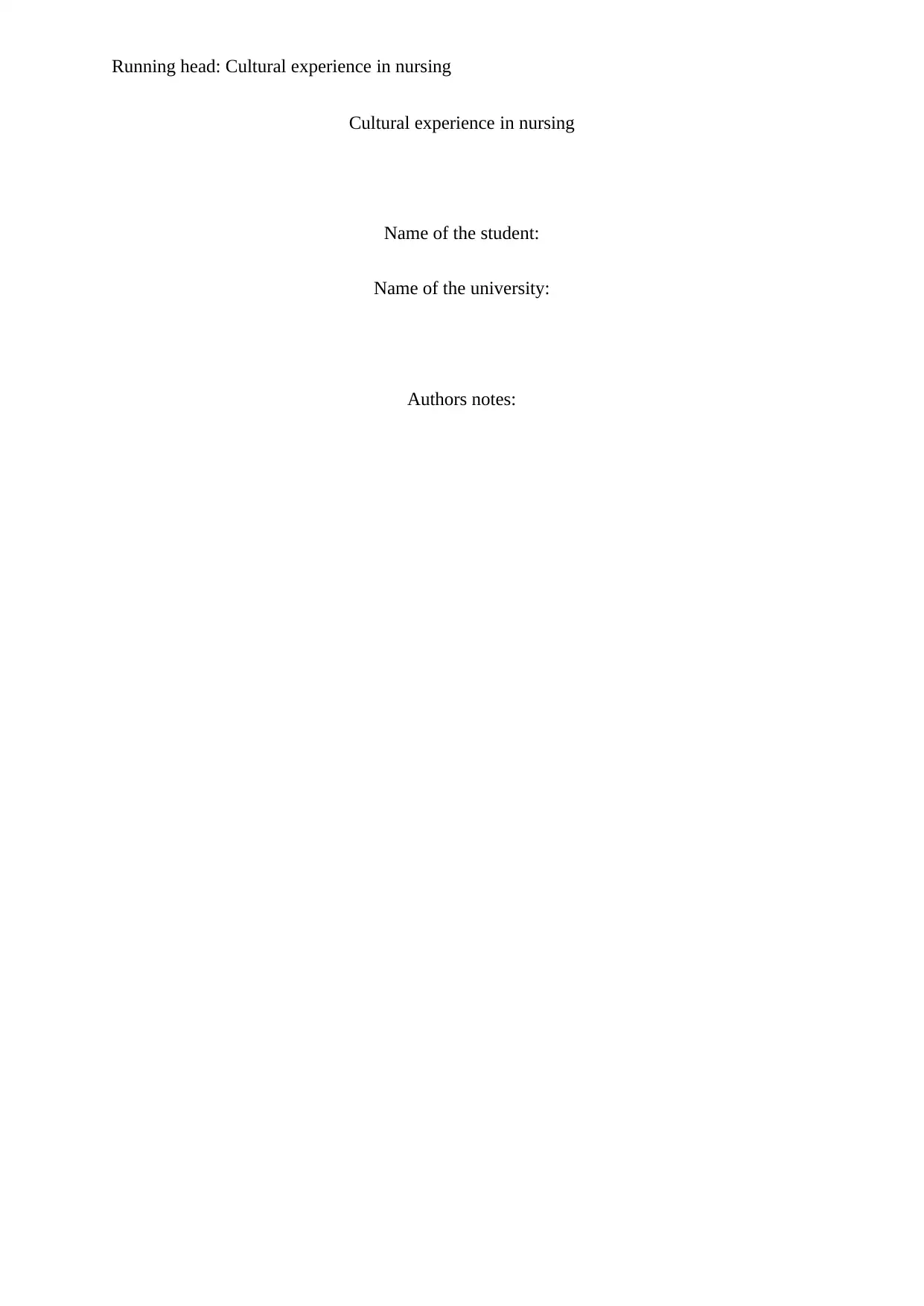
Running head: Cultural experience in nursing
Cultural experience in nursing
Name of the student:
Name of the university:
Authors notes:
Cultural experience in nursing
Name of the student:
Name of the university:
Authors notes:
Paraphrase This Document
Need a fresh take? Get an instant paraphrase of this document with our AI Paraphraser
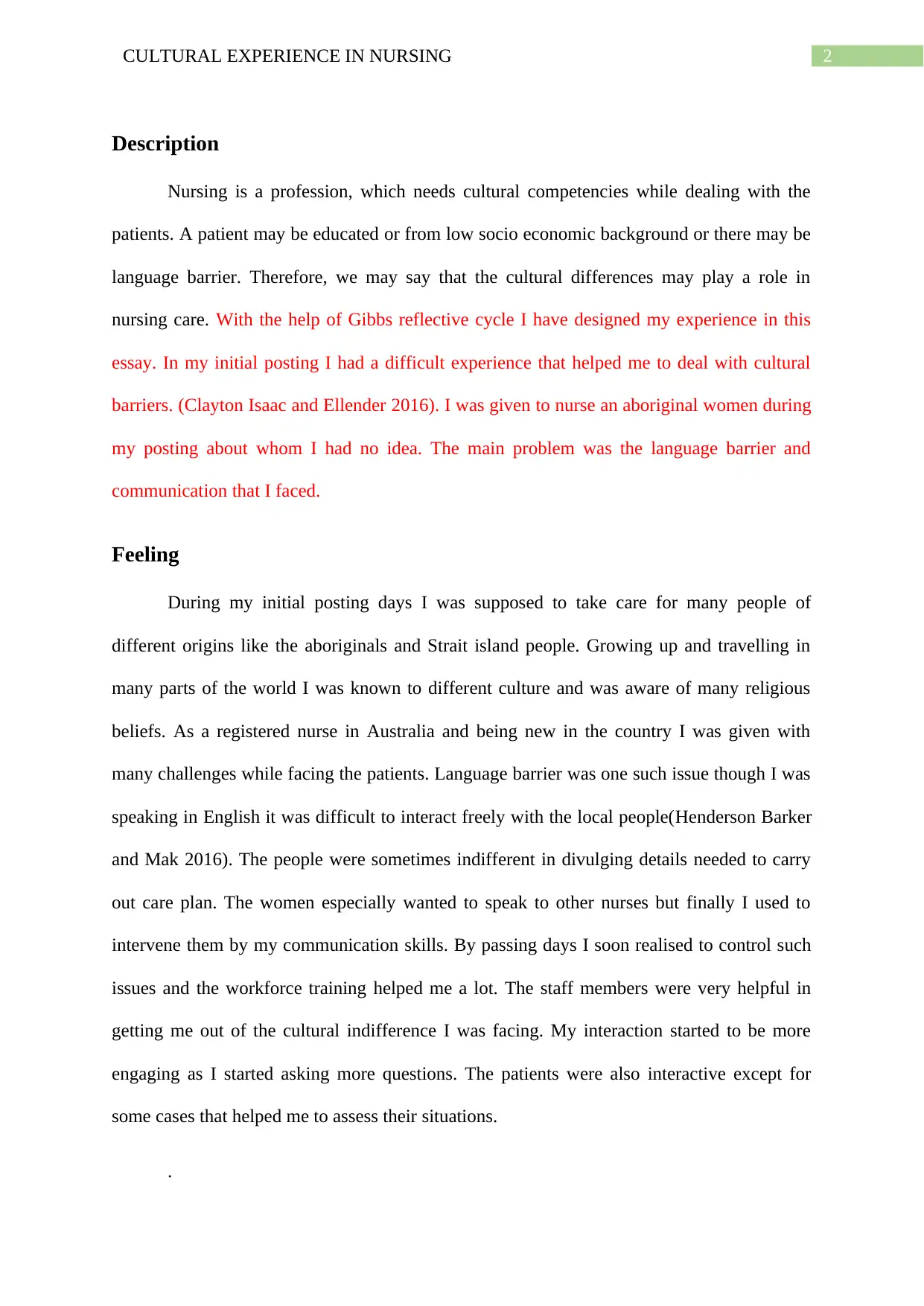
2CULTURAL EXPERIENCE IN NURSING
Description
Nursing is a profession, which needs cultural competencies while dealing with the
patients. A patient may be educated or from low socio economic background or there may be
language barrier. Therefore, we may say that the cultural differences may play a role in
nursing care. With the help of Gibbs reflective cycle I have designed my experience in this
essay. In my initial posting I had a difficult experience that helped me to deal with cultural
barriers. (Clayton Isaac and Ellender 2016). I was given to nurse an aboriginal women during
my posting about whom I had no idea. The main problem was the language barrier and
communication that I faced.
Feeling
During my initial posting days I was supposed to take care for many people of
different origins like the aboriginals and Strait island people. Growing up and travelling in
many parts of the world I was known to different culture and was aware of many religious
beliefs. As a registered nurse in Australia and being new in the country I was given with
many challenges while facing the patients. Language barrier was one such issue though I was
speaking in English it was difficult to interact freely with the local people(Henderson Barker
and Mak 2016). The people were sometimes indifferent in divulging details needed to carry
out care plan. The women especially wanted to speak to other nurses but finally I used to
intervene them by my communication skills. By passing days I soon realised to control such
issues and the workforce training helped me a lot. The staff members were very helpful in
getting me out of the cultural indifference I was facing. My interaction started to be more
engaging as I started asking more questions. The patients were also interactive except for
some cases that helped me to assess their situations.
.
Description
Nursing is a profession, which needs cultural competencies while dealing with the
patients. A patient may be educated or from low socio economic background or there may be
language barrier. Therefore, we may say that the cultural differences may play a role in
nursing care. With the help of Gibbs reflective cycle I have designed my experience in this
essay. In my initial posting I had a difficult experience that helped me to deal with cultural
barriers. (Clayton Isaac and Ellender 2016). I was given to nurse an aboriginal women during
my posting about whom I had no idea. The main problem was the language barrier and
communication that I faced.
Feeling
During my initial posting days I was supposed to take care for many people of
different origins like the aboriginals and Strait island people. Growing up and travelling in
many parts of the world I was known to different culture and was aware of many religious
beliefs. As a registered nurse in Australia and being new in the country I was given with
many challenges while facing the patients. Language barrier was one such issue though I was
speaking in English it was difficult to interact freely with the local people(Henderson Barker
and Mak 2016). The people were sometimes indifferent in divulging details needed to carry
out care plan. The women especially wanted to speak to other nurses but finally I used to
intervene them by my communication skills. By passing days I soon realised to control such
issues and the workforce training helped me a lot. The staff members were very helpful in
getting me out of the cultural indifference I was facing. My interaction started to be more
engaging as I started asking more questions. The patients were also interactive except for
some cases that helped me to assess their situations.
.
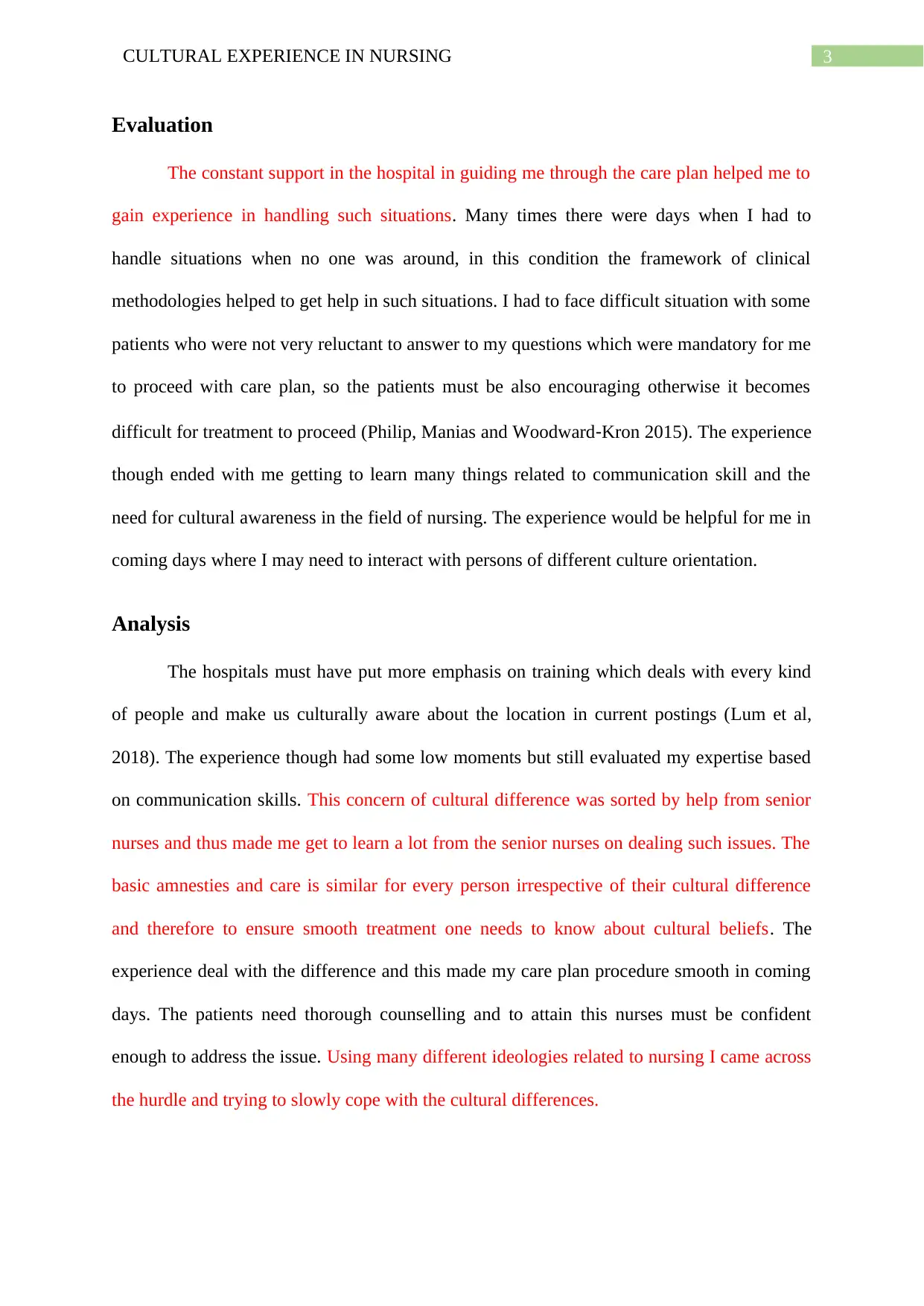
3CULTURAL EXPERIENCE IN NURSING
Evaluation
The constant support in the hospital in guiding me through the care plan helped me to
gain experience in handling such situations. Many times there were days when I had to
handle situations when no one was around, in this condition the framework of clinical
methodologies helped to get help in such situations. I had to face difficult situation with some
patients who were not very reluctant to answer to my questions which were mandatory for me
to proceed with care plan, so the patients must be also encouraging otherwise it becomes
difficult for treatment to proceed (Philip, Manias and Woodward‐Kron 2015). The experience
though ended with me getting to learn many things related to communication skill and the
need for cultural awareness in the field of nursing. The experience would be helpful for me in
coming days where I may need to interact with persons of different culture orientation.
Analysis
The hospitals must have put more emphasis on training which deals with every kind
of people and make us culturally aware about the location in current postings (Lum et al,
2018). The experience though had some low moments but still evaluated my expertise based
on communication skills. This concern of cultural difference was sorted by help from senior
nurses and thus made me get to learn a lot from the senior nurses on dealing such issues. The
basic amnesties and care is similar for every person irrespective of their cultural difference
and therefore to ensure smooth treatment one needs to know about cultural beliefs. The
experience deal with the difference and this made my care plan procedure smooth in coming
days. The patients need thorough counselling and to attain this nurses must be confident
enough to address the issue. Using many different ideologies related to nursing I came across
the hurdle and trying to slowly cope with the cultural differences.
Evaluation
The constant support in the hospital in guiding me through the care plan helped me to
gain experience in handling such situations. Many times there were days when I had to
handle situations when no one was around, in this condition the framework of clinical
methodologies helped to get help in such situations. I had to face difficult situation with some
patients who were not very reluctant to answer to my questions which were mandatory for me
to proceed with care plan, so the patients must be also encouraging otherwise it becomes
difficult for treatment to proceed (Philip, Manias and Woodward‐Kron 2015). The experience
though ended with me getting to learn many things related to communication skill and the
need for cultural awareness in the field of nursing. The experience would be helpful for me in
coming days where I may need to interact with persons of different culture orientation.
Analysis
The hospitals must have put more emphasis on training which deals with every kind
of people and make us culturally aware about the location in current postings (Lum et al,
2018). The experience though had some low moments but still evaluated my expertise based
on communication skills. This concern of cultural difference was sorted by help from senior
nurses and thus made me get to learn a lot from the senior nurses on dealing such issues. The
basic amnesties and care is similar for every person irrespective of their cultural difference
and therefore to ensure smooth treatment one needs to know about cultural beliefs. The
experience deal with the difference and this made my care plan procedure smooth in coming
days. The patients need thorough counselling and to attain this nurses must be confident
enough to address the issue. Using many different ideologies related to nursing I came across
the hurdle and trying to slowly cope with the cultural differences.
⊘ This is a preview!⊘
Do you want full access?
Subscribe today to unlock all pages.

Trusted by 1+ million students worldwide
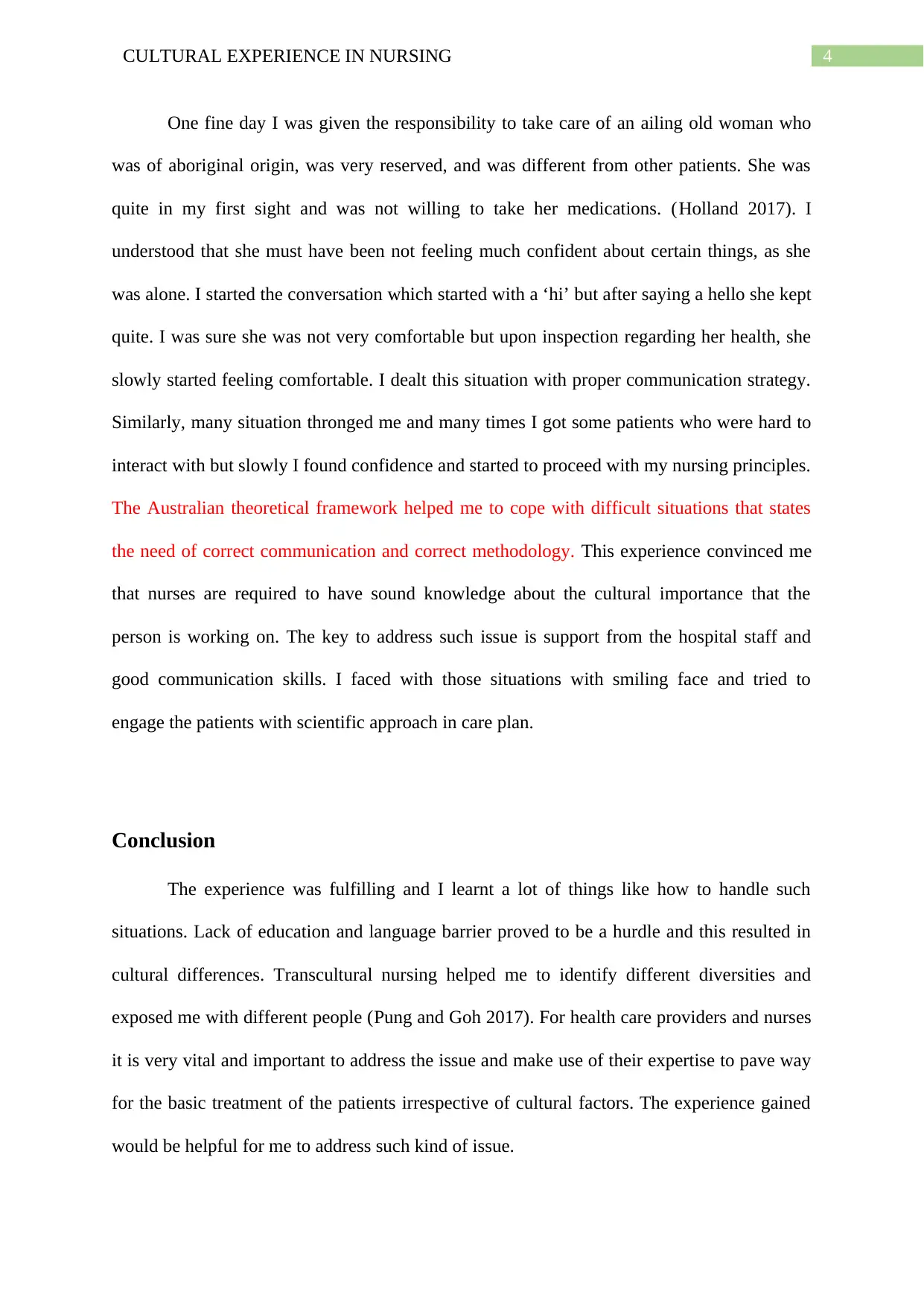
4CULTURAL EXPERIENCE IN NURSING
One fine day I was given the responsibility to take care of an ailing old woman who
was of aboriginal origin, was very reserved, and was different from other patients. She was
quite in my first sight and was not willing to take her medications. (Holland 2017). I
understood that she must have been not feeling much confident about certain things, as she
was alone. I started the conversation which started with a ‘hi’ but after saying a hello she kept
quite. I was sure she was not very comfortable but upon inspection regarding her health, she
slowly started feeling comfortable. I dealt this situation with proper communication strategy.
Similarly, many situation thronged me and many times I got some patients who were hard to
interact with but slowly I found confidence and started to proceed with my nursing principles.
The Australian theoretical framework helped me to cope with difficult situations that states
the need of correct communication and correct methodology. This experience convinced me
that nurses are required to have sound knowledge about the cultural importance that the
person is working on. The key to address such issue is support from the hospital staff and
good communication skills. I faced with those situations with smiling face and tried to
engage the patients with scientific approach in care plan.
Conclusion
The experience was fulfilling and I learnt a lot of things like how to handle such
situations. Lack of education and language barrier proved to be a hurdle and this resulted in
cultural differences. Transcultural nursing helped me to identify different diversities and
exposed me with different people (Pung and Goh 2017). For health care providers and nurses
it is very vital and important to address the issue and make use of their expertise to pave way
for the basic treatment of the patients irrespective of cultural factors. The experience gained
would be helpful for me to address such kind of issue.
One fine day I was given the responsibility to take care of an ailing old woman who
was of aboriginal origin, was very reserved, and was different from other patients. She was
quite in my first sight and was not willing to take her medications. (Holland 2017). I
understood that she must have been not feeling much confident about certain things, as she
was alone. I started the conversation which started with a ‘hi’ but after saying a hello she kept
quite. I was sure she was not very comfortable but upon inspection regarding her health, she
slowly started feeling comfortable. I dealt this situation with proper communication strategy.
Similarly, many situation thronged me and many times I got some patients who were hard to
interact with but slowly I found confidence and started to proceed with my nursing principles.
The Australian theoretical framework helped me to cope with difficult situations that states
the need of correct communication and correct methodology. This experience convinced me
that nurses are required to have sound knowledge about the cultural importance that the
person is working on. The key to address such issue is support from the hospital staff and
good communication skills. I faced with those situations with smiling face and tried to
engage the patients with scientific approach in care plan.
Conclusion
The experience was fulfilling and I learnt a lot of things like how to handle such
situations. Lack of education and language barrier proved to be a hurdle and this resulted in
cultural differences. Transcultural nursing helped me to identify different diversities and
exposed me with different people (Pung and Goh 2017). For health care providers and nurses
it is very vital and important to address the issue and make use of their expertise to pave way
for the basic treatment of the patients irrespective of cultural factors. The experience gained
would be helpful for me to address such kind of issue.
Paraphrase This Document
Need a fresh take? Get an instant paraphrase of this document with our AI Paraphraser
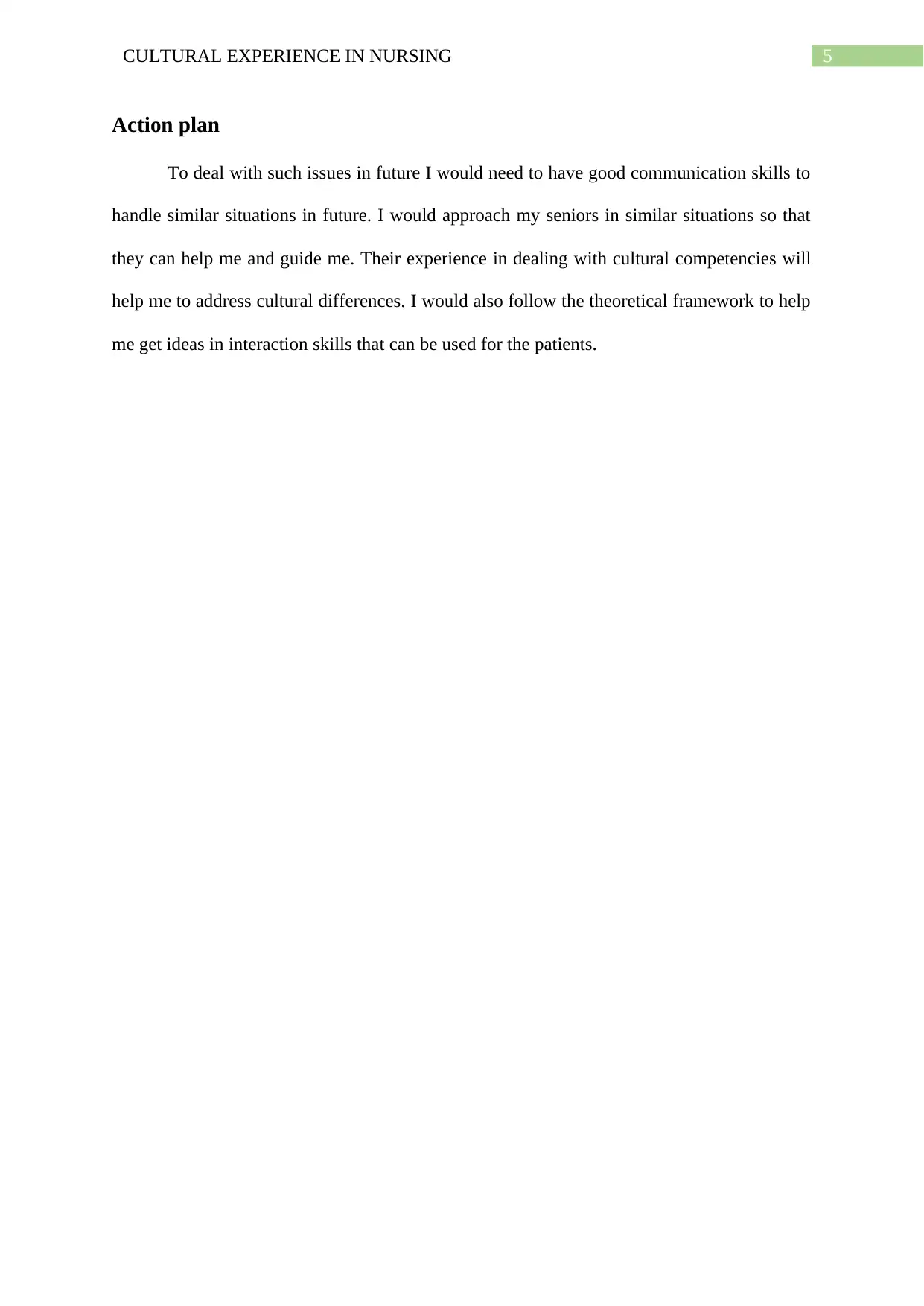
5CULTURAL EXPERIENCE IN NURSING
Action plan
To deal with such issues in future I would need to have good communication skills to
handle similar situations in future. I would approach my seniors in similar situations so that
they can help me and guide me. Their experience in dealing with cultural competencies will
help me to address cultural differences. I would also follow the theoretical framework to help
me get ideas in interaction skills that can be used for the patients.
Action plan
To deal with such issues in future I would need to have good communication skills to
handle similar situations in future. I would approach my seniors in similar situations so that
they can help me and guide me. Their experience in dealing with cultural competencies will
help me to address cultural differences. I would also follow the theoretical framework to help
me get ideas in interaction skills that can be used for the patients.
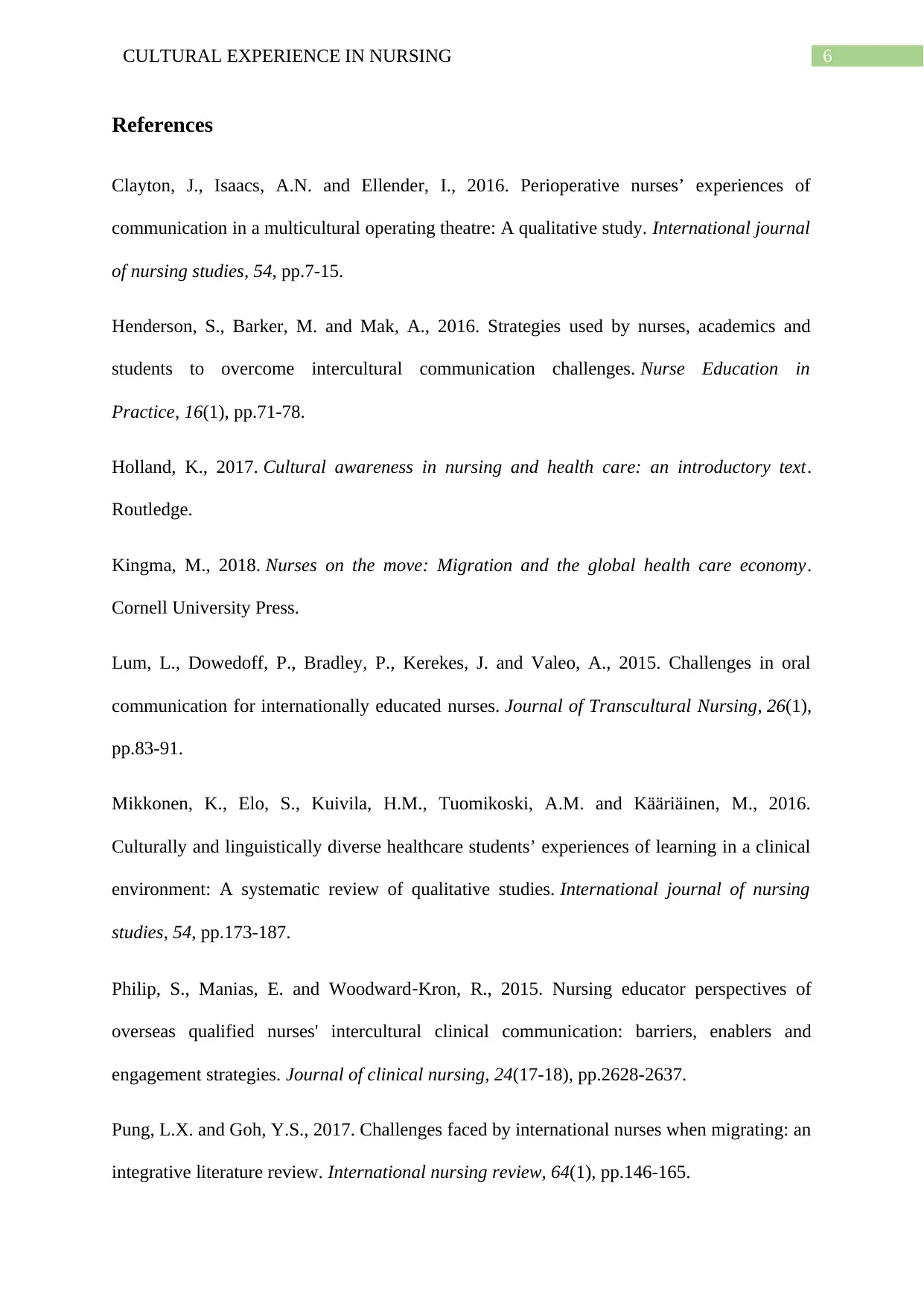
6CULTURAL EXPERIENCE IN NURSING
References
Clayton, J., Isaacs, A.N. and Ellender, I., 2016. Perioperative nurses’ experiences of
communication in a multicultural operating theatre: A qualitative study. International journal
of nursing studies, 54, pp.7-15.
Henderson, S., Barker, M. and Mak, A., 2016. Strategies used by nurses, academics and
students to overcome intercultural communication challenges. Nurse Education in
Practice, 16(1), pp.71-78.
Holland, K., 2017. Cultural awareness in nursing and health care: an introductory text.
Routledge.
Kingma, M., 2018. Nurses on the move: Migration and the global health care economy.
Cornell University Press.
Lum, L., Dowedoff, P., Bradley, P., Kerekes, J. and Valeo, A., 2015. Challenges in oral
communication for internationally educated nurses. Journal of Transcultural Nursing, 26(1),
pp.83-91.
Mikkonen, K., Elo, S., Kuivila, H.M., Tuomikoski, A.M. and Kääriäinen, M., 2016.
Culturally and linguistically diverse healthcare students’ experiences of learning in a clinical
environment: A systematic review of qualitative studies. International journal of nursing
studies, 54, pp.173-187.
Philip, S., Manias, E. and Woodward‐Kron, R., 2015. Nursing educator perspectives of
overseas qualified nurses' intercultural clinical communication: barriers, enablers and
engagement strategies. Journal of clinical nursing, 24(17-18), pp.2628-2637.
Pung, L.X. and Goh, Y.S., 2017. Challenges faced by international nurses when migrating: an
integrative literature review. International nursing review, 64(1), pp.146-165.
References
Clayton, J., Isaacs, A.N. and Ellender, I., 2016. Perioperative nurses’ experiences of
communication in a multicultural operating theatre: A qualitative study. International journal
of nursing studies, 54, pp.7-15.
Henderson, S., Barker, M. and Mak, A., 2016. Strategies used by nurses, academics and
students to overcome intercultural communication challenges. Nurse Education in
Practice, 16(1), pp.71-78.
Holland, K., 2017. Cultural awareness in nursing and health care: an introductory text.
Routledge.
Kingma, M., 2018. Nurses on the move: Migration and the global health care economy.
Cornell University Press.
Lum, L., Dowedoff, P., Bradley, P., Kerekes, J. and Valeo, A., 2015. Challenges in oral
communication for internationally educated nurses. Journal of Transcultural Nursing, 26(1),
pp.83-91.
Mikkonen, K., Elo, S., Kuivila, H.M., Tuomikoski, A.M. and Kääriäinen, M., 2016.
Culturally and linguistically diverse healthcare students’ experiences of learning in a clinical
environment: A systematic review of qualitative studies. International journal of nursing
studies, 54, pp.173-187.
Philip, S., Manias, E. and Woodward‐Kron, R., 2015. Nursing educator perspectives of
overseas qualified nurses' intercultural clinical communication: barriers, enablers and
engagement strategies. Journal of clinical nursing, 24(17-18), pp.2628-2637.
Pung, L.X. and Goh, Y.S., 2017. Challenges faced by international nurses when migrating: an
integrative literature review. International nursing review, 64(1), pp.146-165.
⊘ This is a preview!⊘
Do you want full access?
Subscribe today to unlock all pages.

Trusted by 1+ million students worldwide
1 out of 6
Related Documents
Your All-in-One AI-Powered Toolkit for Academic Success.
+13062052269
info@desklib.com
Available 24*7 on WhatsApp / Email
![[object Object]](/_next/static/media/star-bottom.7253800d.svg)
Unlock your academic potential
Copyright © 2020–2025 A2Z Services. All Rights Reserved. Developed and managed by ZUCOL.




